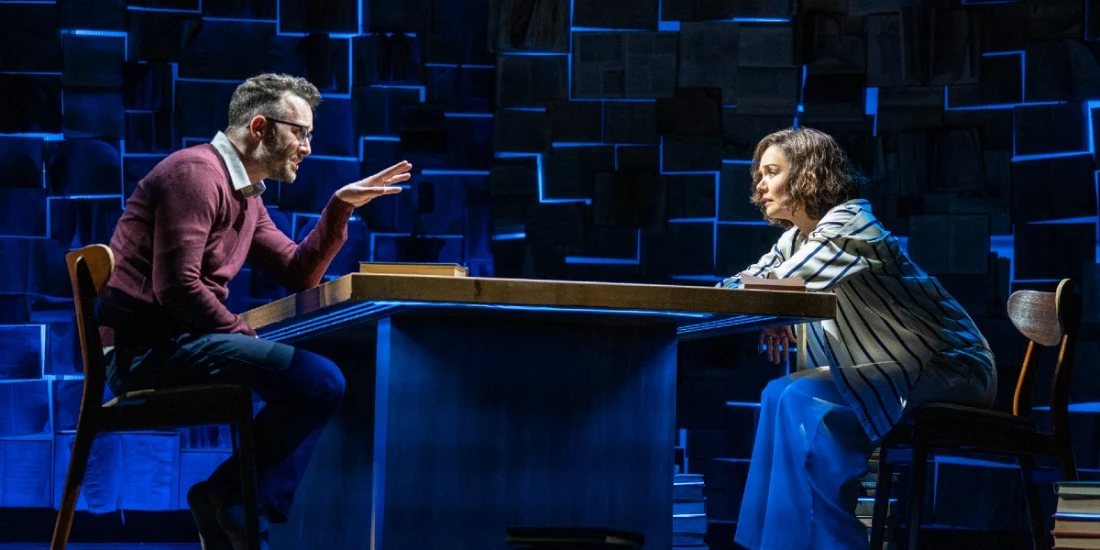'The Wanderers' review — new play wanders around for meaning, but doesn't quite find it
Read our review of Anna Ziegler's new play The Wanderers, starring Katie Holmes, at the Harold and Miriam Steinberg Center for Theatre through April 2.
The Jewish people have long been referred to as the “people of the book.” The Wanderers, Anna Ziegler’s much-delayed Roundabout Theatre Company production, lets this nickname define its characters and setting. Pious Esther, for one, sneaks books from the local library, letting the tales of Winnie-the-Pooh and Little Women shape her view of a life beyond Brooklyn.
Scenic designer Marion Williams turns a Williamsburg apartment into a wall of open books, a domineering structure that almost resembles a memorial. And Ziegler’s script, in the hands of director Barry Edelstein, simultaneously wants to eviscerate the image of the Jewish male novelist and justify his arrogance, to tell us he only whines because he has something worth whining about.
The Wanderers follows Abe (Eddie Kaye Thomas), a secular Jewish novelist who has found critical acclaim writing about generational trauma. He fears he had not revealed enough of himself in his earlier novels and that now, as his children grow and his marriage crumbles, he will reveal too much with his next. Like Roth, he wants to both hide and unfold himself through his books, ultimately pursuing an emotional affair when he believes his wife no longer understands the aspirations of his capital-L Literature.
His wife, Sophie (Sarah Cooper), is also a writer, though her output has been stymied by her two children and their endless demands on her time. Abe all but admits he sees her writing as less important than his and that their children prefer her in charge. Abe and Sophie began dating as teenagers, their mothers lifelong best friends, but Abe is falling head over keyboard for Julia Cheever (Katie Holmes), a famous actress who began emailing him after attending one of his book readings.
Holmes's casting as a heightened version of herself (minus the email affair) is the golden goose for The Wanderers, a play most concerned with people obsessing over how others perceive them. Holmes’s Julia is happy to be a walking muse, a lightbulb that turns on whenever Abe needs her, brightening the story with her unassuming charm.
Consumed by his writing, his newfound pursuit of Julia, and unresolved grief over his parents and childhood, Abe no longer sees Sophie as a person. Neither does the script. We don’t know much about her writing, her relationship to her children, or her opinions on her parents beyond petty arguments. She both refutes and agrees with Abe’s offhanded accusation that she isn’t truly Jewish because of her mixed heritage; this internal conflict for a Black Jewish woman, a character we rarely see on stage, deserves as much time as Abe’s self-righteous emails. Disparaging Cooper’s wooden performance feels unfair in the face of her underwritten character.
Throughout the modern scenes of a marriage, The Wanderers also explores the lives of Schmuli (Dave Klasko) and Esther (Lucy Freyer), a young Satmar Hasidic couple whose newlywed life is both titillating and suffocating. As members of one of the most secluded Hasidic sects in Judaism, Schmuli and Esther rarely interact with non-Jews and avoid things like computers or even the radio. Not all the details about Satmar life are correct, but the play captures the tension between Esther’s love of her religious and cultural life and her desire to explore past its boundaries.
Klasko’s Schmuli, endearing until the moment he isn’t, has spent a lifetime associating manhood with the capacity to control. Klasko’s sharp and fluid Yiddish is a stark contrast to Freyer’s, which jumbles in her mouth. The couple’s story is more engaging than Abe and Sophie’s, though an attempt to connect Sophie and Esther through a traumatic experience doesn’t feel supported by the text or performances.
The Wanderers feels purposely manufactured for the audience who will come see it: Older, largely upper class, largely secular Jewish patrons. The play does not feel like a vehicle of cultural representation, but one the creative team can market to a reliable theatregoing audience without much effort.
Elements of the story — deception of a loved one, parasocial relationships, whether we can be someone outside the influence of our parents — are worthy facets of a family drama. But their execution — hokey Klezmer scene transition music and Hebrew phrases, thrown in at the ends of conversations for no purpose beyond showing that the playwright knows them — are faulty. The play does not feel like an artistic exploration of the search for meaning in the lives of people grappling with personal and familial failures. It feels, davka, like pandering.
Photo credit: Eddie Kaye Thomas and Katie Holmes in The Wanderers. (Photo by Joan Marcus)
Originally published on
